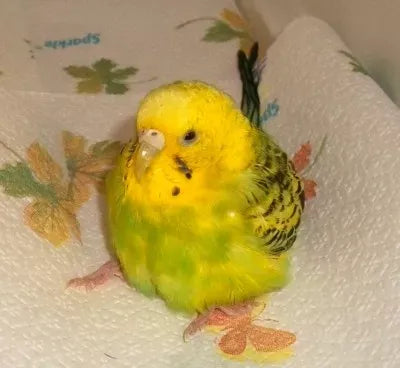So, your pet bird is pregnant? Congrats! You're about to embark on a feathery adventure filled with chirps, nibbles, and maybe just a sprinkle of chaos. Caring for a pet bird pregnant is a unique experience, and we're here to pluck a few essential tips from the sky!
Understanding Your Pregnant Pet Bird:
A Comprehensive Guide If you're a bird enthusiast and have recently noticed signs that your pet bird may be pregnant, you might be feeling a mix of excitement and concern. Unlike mammals, birds don't experience pregnancy in the traditional sense, but they can lay eggs, which can signal the start of a nesting period if they're in breeding condition. Here's what you need to know about caring for your pet bird during this special time.
#### Signs Your Bird May Be Preparing to Lay Eggs 1. **Nesting Behavior**: Look out for changes in behavior. If your bird starts gathering materials to create a nest—like shredded paper, fabric, or other soft materials—this is a strong indicator that she may be preparing to lay eggs.
2. **Increased Affection or Territoriality**: Many female birds become more affectionate towards their owners or, conversely, may exhibit territorial behavior, especially if they feel the need to protect a nesting area.
3. **Body Changes**: In some cases, you might notice physical changes, such as a rounded abdomen, which could suggest that your bird is producing eggs.
4. **Vocalization Changes**: Some birds become more vocal and may change their calls or songs when they are in breeding condition. #### Preparing for Egg Laying If you suspect your bird is pregnant or preparing to lay eggs, here are some essential steps you should take:
- **Provide a Safe Nesting Environment**: Offer a quiet, comfortable place for your bird to nest. This could be a nesting box or a secluded area in her cage lined with soft bedding.
- **Nutrition and Hydration**: Ensure your bird has a balanced diet rich in calcium and other nutrients, which are crucial for egg production. Fresh fruits, vegetables, and specially formulated bird pellets can significantly aid in maintaining her health.
- **Minimize Stress**: Reduce stress in the environment by keeping loud noises and other pets away from her space. Consider covering her cage with a light cloth to provide a sense of security.
- **Monitor Your Bird’s Health**: Pay close attention to her behavior and physical health. If you notice any signs of distress, lethargy, or unusual droppings, consult your avian veterinarian promptly.
- **Limit Interaction with Potential Mates**: If you have multiple birds, ensure that you monitor interactions closely. If you have an unpaired male, it's crucial to keep them apart to prevent unwanted breeding. #### After the Eggs are Laid Once your bird lays eggs, it’s important to know that she may be in a sensitive state. Here are some care tips: - **Egg Handling**: Do not handle the eggs unless necessary, as this can cause anxiety for the mother bird. - **Fostering**: If your bird is a first-time mother or if you notice she's not caring for the eggs properly, you may need to intervene. In some cases, foster care by an experienced bird owner may be necessary. - **Post-Laying Care**: After the eggs are laid, continue to provide high-quality nutrition and a stress-free environment to support your bird's recovery and health.
- #### Conclusion Caring for a pregnant pet bird can be an exhilarating yet challenging experience. By understanding her needs during this time, providing a nurturing environment, and staying vigilant about her health, you can ensure she remains happy and healthy. Always consult with an avian veterinarian if you have concerns or questions about your bird’s reproductive health. Stay tuned for our next blog post, where we’ll dive deeper into the best breeding practices for pet birds and how to care for baby birds once they hatch!
In case you still need a few more tips that I use and for personal experince and you also replicate and it is :
1. Set Up a Cozy Nesting Spot
Your feathered friend needs a nesting area that feels like a five-star hotel. Think soft bedding, privacy, and maybe even some nice views of the bird feeder! Avoid overcrowding the space with toys – unless you want a pet bird drama unfolding like a reality show.
2. Nutrition: Feed Her Like Royalty
If your pet bird is pregnant, it’s time to whip up a gourmet menu. Fresh fruits, veggies, and high-quality seeds should be on the menu, but skip the junk food. No pizza parties for this birdie! Just imagine the mess of a bird on a pizza binge… no thanks!
3. Chill Vibes Only
Pregnancy can be stressful for our feathered friends, so keep those noise levels down. Avoid loud music, vacuuming, or any unexpected dance parties. Instead, engage in calm moments with gentle chats and soothing sounds. Your pregnant pet bird will appreciate the zen environment – and who knows, you might end up with the next bird yoga guru!
4. Regular Vet Check-ups
It's all fun and games until something lays an egg – literally! Scheduling regular vet visits can help ensure that your pet bird stays healthy throughout her pregnancy. Plus, the vet can provide more tips and advice. Just don't forget to bring some birdy snacks; nobody likes an empty stomach during a check-up!
5. Prepare for Babies!
Eggs mean babies, and babies mean adorable chaos! Get ready for some serious cuteness overload. Make sure you've got a plan for the hatchlings because your pet bird’s parenting skills (or lack thereof) will be on full display. Remember, it takes a village – even a bird village!
Final Thoughts
Caring for a pregnant pet bird can be both rewarding and entertaining. With these essential tips, you’ll be on your way to a delightful nesting experience. Now, get ready to play the role of supportive feathered friend and have fun with it!




Share:
Why is important to keep your pet reptile warm?
Effective Solutions for Eliminating Strong Smell from Dog Urine in Your Home